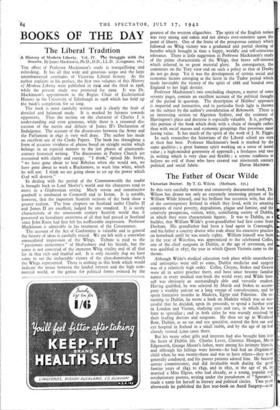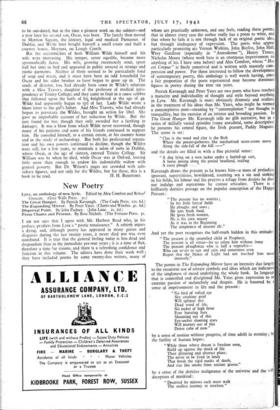The Father of Oscar Wilde
Victorian Doctor. By T. G. Wilson. (Methuen. 15s.)
IN this very carefully written and extensively documented book, Dr. Wilson has drawn not only an extremely interesting picture of Sir William Wilde himself, and his brilliant but eccentric wife, but also of the contemporary Ireland in which they lived, with its amazing contrasts of rural poverty, degradation, plague and famine, and the relatively prosperous, violent, witty, scintillating society of Dublin, in which they were characteristic figures. It was to Dublin, as a builder, that William Wilde's great-grandfather had first come from Durham. His grandfather had been a land agent in Connaught, and his father a country doctor who rode about his extensive practice on horseback until he was nearly eighty. William himself was born in the year of Waterloo, was apprenticed to the celebrated Colles, one of the chief surgeons in Dublin, at the age of seventeen, and was qualified in 1837, the year in which Queen Victoria came to the throne.
Although Wilde's medical education took place while anaesthetics and antiseptics were still to come, Dublin medicine and surgery was of a relatively high order. Colles, Cheyne, Stokes and Graves were all in active practice there, and have since become familiar names in every medical text-book the world over; and Wilde him- self was obviously an outstandingly able and versatile student. Having qualified, he was selected by Marsh and Stokes to accom- pany a wealthy patient on a long voyage of convalescence, and he spent formative months in Madeira, Egypt and Palestine. On re- turning to Dublin, he wrote a book on Madeira which was so suc- cessful that he decided, upon its proceeds, to spend a further year in London and Vienna, studying eyes and ears, in which he was later to specialise ; and in both cities he was warmly received by their leading doctors and surgeons. He then set up in Westland Row, Dublin, as an ear and eye specialist, started the first ear and eye hospital in Ireland in a small stable, and by the age of 29 had already treated 2,000 cases there.
But his many ether gifts and interests had also brought him into the heart of Dublin life. Charles Lever, Clarence Mangan, Maria Edgeworth, George Moore's father, were among his intimate friends, and although his failings were known—he had had an illegitimate child when he was twenty-three and was to have others—they were generally condoned, and his poorer patients adored him. He became census commissioner, and did invaluable work during the great famine years of 1845 to 1849, and in x85r, at the age of -36, he married a Miss Elgree, who had already, as a young, popular and revolutionary poetess, writing under the pseudonym of "Speranza,
made a name for herself in literary and political circles. Two years afterwards he published the first text-book on Aural Surgery—soot' to be out-dated, but at the time a pioneer work on the subject—and a year later his secand son, Oscar, was born. The family then moved to Merrion Square, the literary, legal and medical Parnassus of Dublin, and Wilde later bought himself a small estate and built a country house, Moytura, on Lough Corrib.
But the eccentricities of both William Wilde himself and his wife were increasing. His temper, never equable, became more spasmodically fierce. His wife, growing enormously stout, spent half her time in bed and appeared in public arrayed in strange and exotic garments. Neither of them seemed to be particularly fond of soap and water, and it must have been an odd household for Oscar and his elder brother to have begun to grow up in. The seeds of disaster, too, had already been sown in Wilde's relations with a Miss Travers, daughter of the professor of medical juris- prudence at Trinity College; and they came to fruit in a cause celebre that followed upon the heels of his knighthood at the age of 49. Wilde had apparently begun to tire of her. Lady Wilde wrote a blunt letter to the girl's father. And Miss Travers, who had already begun to persecute the Wildes, brought an action for libel. She gave an improbable account of her seduction by Wilde. But the jury found for her, though they only awarded her a farthing in damages. It was a blow from which Wilde never recovered, though Many of his patients and some of his friends continued to support him. He consoled himself, to a certain extent, at his country home and in the study of archaeology. But both his professional reputa- tion and his own powers continued to decline, though the Wildes were still, for a few years, to maintain a salon of sorts in Dublin, where Oscar, at the age of sixteen, entered Trinity College. Sir William was 61 when he died, while Oscar was at Oxford, leaving little more than enough to endow his indomitable widow with genteel poverty. But Dr. Wilson's pages are crowded with sub- sidiary figures, and not only for the Wildes, but for these, this is a



























 Previous page
Previous page